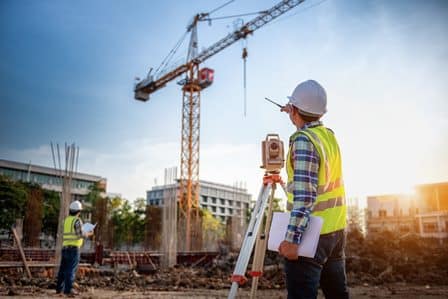Course Overview
Civil engineers are responsible for ensuring that the infrastructure around us gets developed, is safe, meets our needs, and improves our quality of life. This includes buildings, bridges, railways, tunnels, water distribution, and waste management networks. This practical qualification will ensure you graduate job-ready as a civil and structural engineering technologist. Upon completion of this program, you will gain skills and knowledge in the latest and developing technologies in civil and structural engineering.
This course is internationally recognized under the Sydney Accord.
Program Details
Civil and structural engineering is one of the oldest forms of engineering which involves the design, construction, and maintenance of the built environment. Engineers in this field are responsible for ensuring that the infrastructure around us gets developed, is safe, meets our needs, and improves our quality of life. This includes buildings, bridges, railways, tunnels, water distribution, and waste management networks. As a civil engineer, you could be involved in sustainable urban development, environmental protection, conservation of energy and water resources, or even geotechnical, hydraulic, or transport engineering. You could even specialize in fields such as earthquake and blast-resistant technologies.
With this qualification, you will have acquired the essential knowledge which underpins both this and other fields of engineering. More importantly, you will have become a civil and structural engineering technologist.
The degree consists of a combination of common units, sub-discipline specific ‘stream’ units, industrial work experience, and a final year project. The program duration is three years full-time. We deliver units over two semesters per year, and you will take 4 to 5 units per semester. There will be a short mid-semester break and extended breaks between semesters. Please refer to the current teach-out program structure here.
Year One
| Unit Code | Subjects | Credit Points |
| BSC101 | Engineering Mathematics 1 | 3 |
| BCS102 | Construction Materials | 3 |
| BSC103 | Engineering Physics and Materials | 3 |
| BSC104 | Engineering Drawing and CAD | 3 |
| BSC105 | Engineering Ethics and Professional Practice | 3 |
| BSC106 | Engineering Mathematics 2 | 3 |
| BSC107 | Engineering Programming | 3 |
| BSC108 | Engineering Statics | 3 |
| BSC109 | Fluid Mechanics | 3 |
Year Two
| Unit Code | Subjects | Credit Points |
| BSC201 | Engineering Management | 3 |
| BCS202 | Construction Engineering | 3 |
| BCS204 | Strength of Materials | 3 |
| BCS205 | Engineering Surveying | 3 |
| BCS207 | Soil Mechanics | 3 |
| BCS206 | Hydraulics | 3 |
| BCS203 | Introduction to Structural Analysis | 3 |
| BCS208 | Design of Steel and Timber Structures | 3 |
| BCS209 | Geotechnical Engineering | 3 |
Year Three
| Unit Code | Subjects | Credit Points |
| BCS301 | Design of Concrete Structures | 3 |
| BCS302 | Road Design | 3 |
| BCS303 | Civil Design | 3 |
| TBA | Elective-1 | 3 |
| TBA | Elective-2 | 3 |
| BSC305 | Technology, Sustainability and Society | 3 |
| BSC307 | Engineering Capstone Project | 9 |
Additional Mandatory Units
| Unit Code | Subjects | Credit Points |
| Hands-on Workshop 1 | 0 | |
| BXX001-004 | Hands-on Workshop 2 | 0 |
| Hands-on Workshop 3 | 0 | |
| Hands-on Workshop 4 | 0 | |
| BSC210 | Industrial Experience |
List of Electives* (2 Electives to be selected)
| Unit Code | Subjects | Credit Points |
| BSC202 | Engineering Mathematics 3 | 3 |
| BME302 | Automation, Measurement and Control | 3 |
| BME303 | Computer Aided Technology | 3 |
| BIA206 | Data Analytics and Artificial Intelligence | 3 |
| BCS310 | Design of Modular Construction | 3 |
| BCS311 | Building Information Modelling | 3 |
| BSC102 | Electrical Circuit Theory and Analysis | 3 |
| BME204 | Machine Dynamics | 3 |
Work-Integrated Learning
EIT’s Bachelor of Science programs require students to undertake 240 hours of paid or unpaid professional work-integrated learning. This can incorporate paid or unpaid internships, site visits, contributing to industry projects, and networking activities. In undertaking an internship, students will interact with employees and become exposed to organizational policy and culture. You will familiarize yourself with organizational communication procedures, a variety of engineering disciplines, and obtain insight and practical aptitude in projects from the planning phase to completion. If you already have some work experience in the relevant engineering field, you may apply to have credit granted by completing the associated recognition of prior learning form.
Bachelor of Science (Civil and Structural Engineering) – Mapping of Program Learning Outcomes with Graduate Attributes and Engineers Australia Stage 1 Competencies for Engineering Technologists.
The leader for this program is Dr. Shasha Wang
Entry is available to applicants who hold one of the following:
1. Year 12: Australian Senior Certificate of Education (or equivalent), completed within the past 3 years, with a minimum score of 60% in Maths;
- Applicants who have completed Yr 12 (or equivalent) more than 3 years ago will also need to demonstrate relevant work experience in the field of study applied for.
2. A relevant (to the sub-discipline) Engineering AQF Diploma or higher or a relevant (to the sub-discipline) overseas qualification equivalent to an Engineering AQF Diploma or higher which was completed within the last 10 years with successful completion of all Maths units/modules + recent industry work experience in a relevant field.
English Language Proficiency Requirements:
Entry to this course requires demonstration of English language proficiency at the level of an IELTS overall score of at least 6.0 (with no individual band score less than 5.5)
The methods of satisfying this English language proficiency requirements are generally through (but not limited to):
- An Australian Senior Certificate of Education or equivalent.
- A specified level of achievement in a recognised English language test, such as IELTS (or equivalent).
- Satisfactory completion of another tertiary course offered in English.
- Work history in an organization where English is the language of communication.
NOTE: All CRICOS applicants from non-English speaking countries (as determined by the Australian Department of Home Affairs) are required to provide results from a recognised language test such as IELTS or equivalent.
NOTE: All applications will be assessed on a case-by-case basis.
Please check the Documentation Guidelines for your application.
For full current fees in your country go to the drop down filter at the top of this page or visit the Fees page.
Payment Methods
Learn more about payment methods, including payment terms & conditions and additional non-tuition fees.
Like all Australian higher education providers and universities, EIT programs are accredited by the exacting standards of the Australian Government’s Tertiary Education Quality and Standards Agency (TEQSA).
This on-campus bachelor’s degree (Perth Campus only) is fully accredited by Engineers Australia under the Sydney Accord. It is internationally recognized through the International Engineering Alliance (IEA) and its signatory countries, ensuring global recognition of the qualification and alignment with international engineering education standards.
You can find the accreditation here.
Find out more about country-specific accreditation and professional recognition.
This course is classified as Level 7 under the Australian Qualifications Framework (AQF).
This course may use the following software:
- Desmos online calculator
- Virtual Labs-Strength of Materials/Self-Compacting Concrete/Building Materials Virtual Lab
- Autodesk Inventor
- MATLAB
- Python 3.10
- CodeBlocks C/C++ IDE
- Repl.it (Cloud IDE)
- Ansys Fluent
- AutoCAD / Excel
- Solidworks
- Pipeflow
- Excel / AustPADS
- MS Project
- Autodesk Revit
- Autodesk Navisworks
- PowerFactory
- LabView
- ANSYS
- Inventor
- Additional Mandatory Units
- Python Jupyter Notebook
- Google Colab
- Automation Studio
- Inventor
- Ansys workbench
- Pytorch
- KNIME
- Apache Mahout
- National Instruments
- ELVISmx Instrument Launcher (on Remote Lab)
- National Instruments Multisim (on Remote Lab)
- MechAnalyser
Due to ongoing unit and course reviews, software may change from the list provided. Learn more about the Practical Learning at EIT here
Potential job roles include engineering and management positions in the following areas of expertise:
- Civil and structural planning, design and development
- Building contracts, sales, commissioning and consultation
- Building control and surveying
- Site management
- Water and waste management
- Civil and structural operations and maintenance
- Civil and structural project management and business development
Our bachelor’s degrees take three years to complete full-time. Full-time students will spend approximately 40 -50 hours per week on study .This includes learning the program material, completing assessments and attending tutorials.
Applications are open for our upcoming intake. You must submit your application at least four weeks before the start date to be considered for your desired intake.
A census date is the date at which an enrolment is considered to be final. Any withdrawal you make after the study period census date will incur an academic penalty (for example, a fail grade) and a financial penalty (for example, no refund of your student contribution or tuition fees). See our current census dates.
Any student has a right to appeal a decision of the Engineering Institute of Technology (EIT) or any member of the institute’s staff. EIT has a comprehensive Policy on Appeals and Grievances to assist students.










